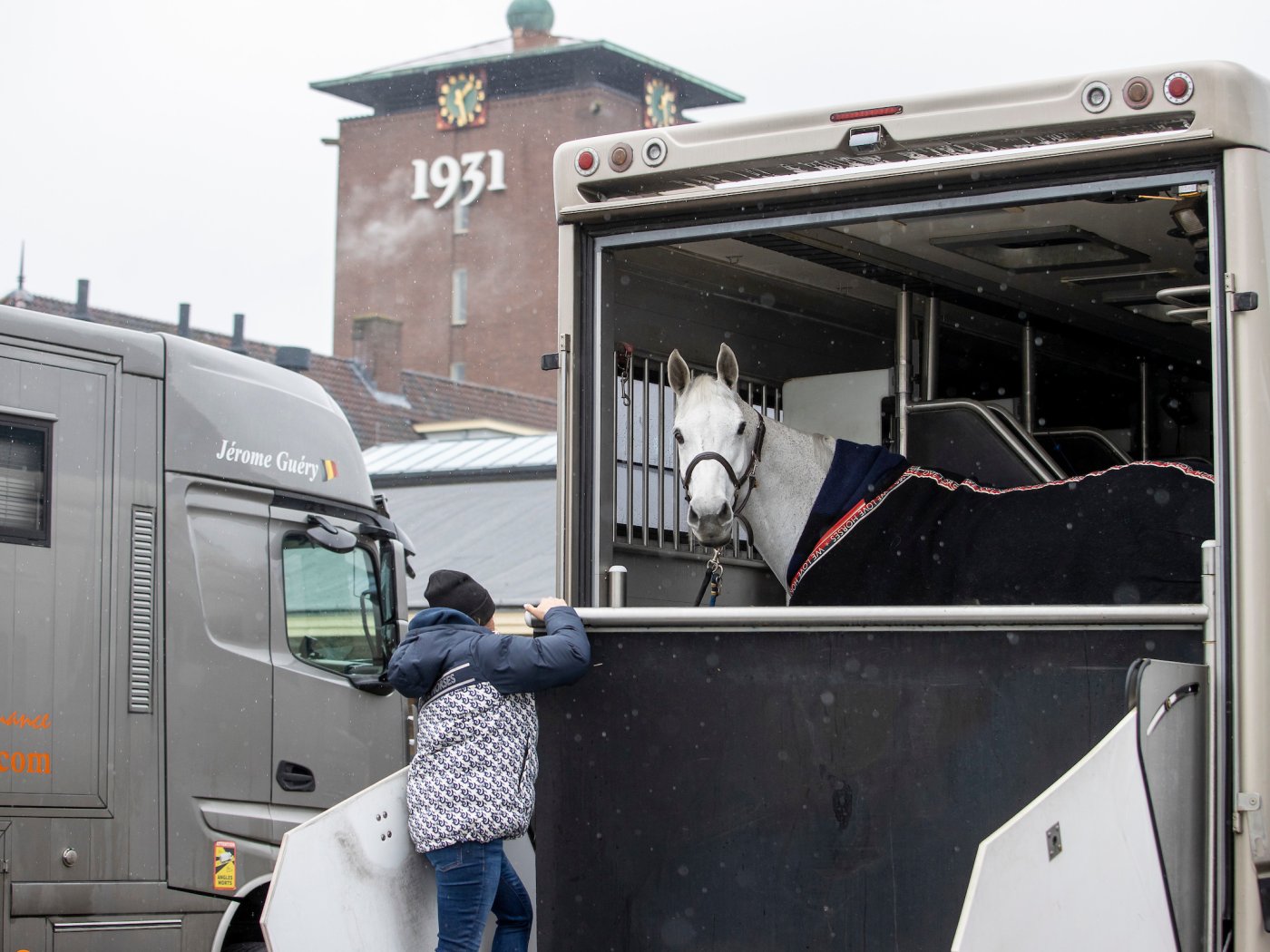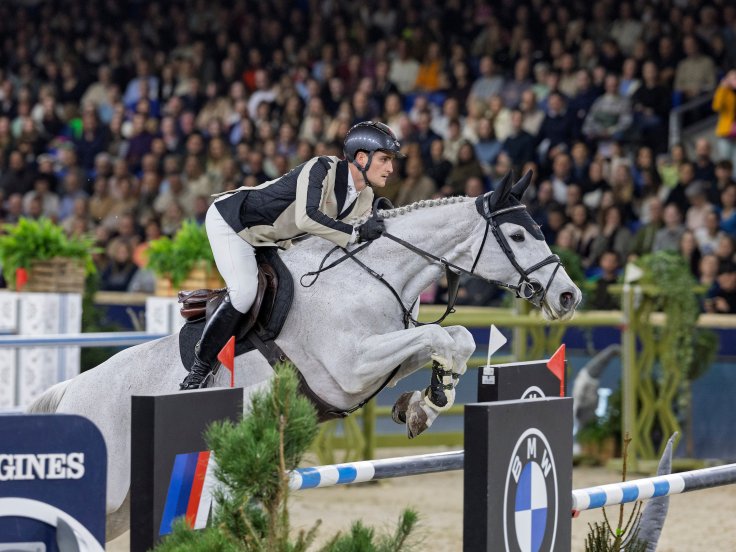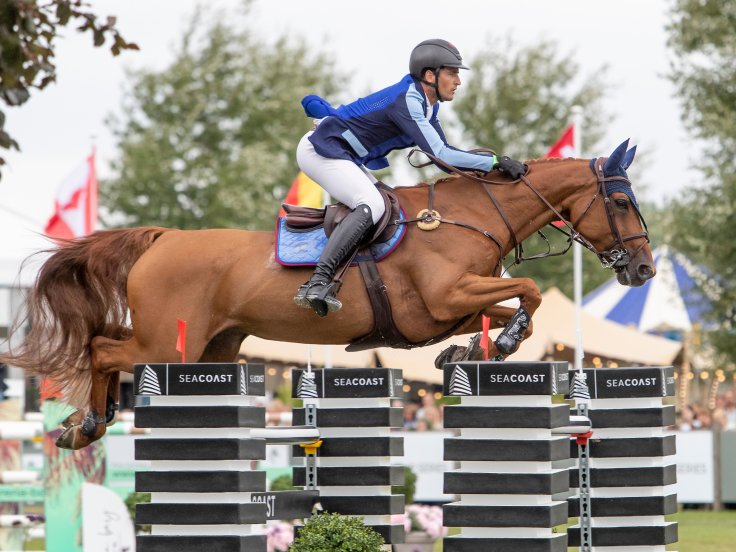Top-level sport means travelling all over the world. It sometimes takes hours or even days to get to the venue of a competition and the transportation, by road or plane, can be stressful for the horses. To ensure that they stay in top form and to make the journey as enjoyable as possible for them, it is important to always take along suitable feed, equipment and the right supplements.
Wondering what we do and how we solve travel issues such as weight loss? Then be sure to read ahead and discover all the tips and tricks from our grooms.
The impact of travel on horses
A normal effect that travelling has on the horse is that it will eat less. During short transports, for example to a competition half an hour to an hour away, this does not cause a problem. However, when the horses are on transport for longer periods of time and thus do not eat and drink for a longer time, the risk of colic and dehydration may increase. It is therefore important to encourage them to drink and eat along the way.
Easy to say, but what about the fussy drinkers who only want the water from home? For them, you can carry water in large canisters. Are you going away for such a long time that providing a water supply is not possible? Then you can choose to add a small amount of apple cider vinegar to the water. Even the pickiest horse will drink like he does at home! Our preference of buckets is Rubco's, these are strong and sturdy, ideal for long trips.
Transportation on the road
"Before a long journey, I always try to keep the horses as healthy as possible. Lannoo Fibermix is always a good choice for this as it digests slower so the horses don't get hungry so quickly on the road. I combine this with Cavalor Resist, Vitamin C and prebiotics (Cavalor Vitaflora) to boost their immune system and keep the intestines healthy as they can suffer from the stress of travelling anyway" , says Martynna, show groom of Anthony.
"Even for younger horses and horses that are easily stressed, I have my tricks to keep them calm. Cavalor Emergency 911 works wonders on transport. Another tip to prevent stress is not to give horses hay on the truck or trailer at night," says Martynna.
"More tips for a calm horse on the road, is not to tie them up too short so they can rest their heads when they get tired. Also, always put horses next to each other that know one another, this will prevent them from fighting among themselves. Finally, it is also important to make sure there is plenty of fresh air in the truck or trailer. To do this, I always open the windows behind the horses and, if necessary, the roof. If it is really hot, like in summer, we even turn on the air conditioning. However, when opening the windows and the roof, you have to be careful that the horse does not get cold. That is why a blanket is recommended, except for young horses or those that do not travel much, as they can start sweating from the stress, which in turn can lead to dehydration or even colic. To make sure the horses are soft and clean, we use wood shavings."
Transport by air
"To make the plane journey as pleasant as possible for the horses, I always give them two things. First they get mash (Fiber Mash Lannoo) with electrolytes (Cavalor Electroliq Balance or Electrolyte Balance) which keeps them hydrated, then an hour before the flight they get another tube of Gastro Aid (Gastro Aid Paste) and mash," says Coline, Olivier's showgroom. "During the flight, the horses have access to a bucket of water and two hay nets (we recommend the ones from Rubco). Unless we fly at night, then they don't get hay, because at home they don't get hay at night either and it's good to keep the same routine. We ourselves cannot reach the whole horse during the flight either, just their head. When we land, the horses get another tube of Gastro Aid and mash."
Tiffany adds that before long trips, such as to the US, she always makes sure the horses are given mash with electrolytes to prevent dehydration. To this, she also adds a little Cavalor Fiber Force to increase the horses' appetite. Of course, she provides hay to keep the horses occupied and, of course, carrots and apples should not be missing to spoil them.
Leg protection
"Only put leg protection on where it is really necessary," both Coline and Claire plead. Just bandaging a horse can lead to unnecessary kicking during transport. Claire knows this from experience and therefore only bandages the front legs. Coline also decides how many bandages are needed for each horse individually and whether jumping boots or transport boots (Veredus) are needed. Whatever is not needed, they both prefer to leave it off.
Transport blankets
Martynna, Coline and Tiffany all go by the idea: a quiet horse can wear a thin blanket, a horse that moves a lot and thus sweats will be more comfortable without it. It is important to consider the weather and the number of horses on a truck, as these are also factors that influence the choice of blanket.
Final tips
To conclude, our grooms would like to give you the following tips. Always ensure adequate ventilation and regularly clean the vehicle on the road to avoid respiratory problems. For this reason, always avoid dusty hay and bedding. Personally, our grooms opt for wood shavings.
The horse should also always have a good halter that is attached to a tie rope with a quick knot. This way, in case of emergency, you can quickly untie the rope.
Last but not least, check that you have all the right equipment with you before you leave. It is important to bring a spare halter and your horse's passport.
As you read, we are fully prepared and now so are you!









